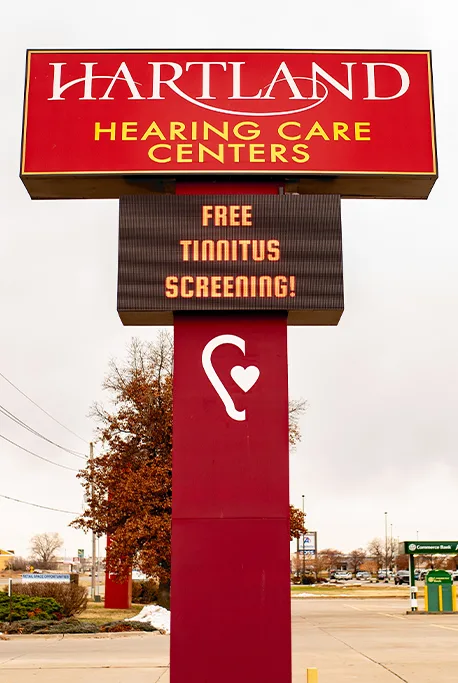
Are You Or Someone You Love Experiencing Ringing, Buzzing or Whistling in your Ears with or without Hearing Aids?
Tinnitus can affect people in many ways.
Hearing
In some cases, the ringing sound of tinnitus can make it difficult to understand speech.
Concentration
Some tinnitus sufferers report difficulty focusing on a book or reading the newspaper.
Thoughts
Some sufferers can be annoyed, bothered, or depressed and think about tinnitus often.
Everyone’s tinnitus is different, which is why every solution should be personalized. Darcie Hartwick is our Nationally Board-Certified Hearing Instrument Specialist and Certified Tinnitus Care Provider who understands tinnitus and can assist you in finding relief with a customized Audibel Tinnitus Treatment Solution tailored just for YOU. Audibel tinnitus devices use precise measurements from your audiogram to create a relief stimulus customized specifically for you. Darcie will adjust sound frequency and modulation to better address your unique tinnitus.
The result is personalized sound therapy designed to:
If you’ve tried other tinnitus relief options without success or are ready to stop letting the ringing in your ears take over your life, schedule your evaluation today. Darcie will provide you with a specialized evaluation to diagnose tinnitus and what relief options are right for you.
What is Tinnitus?
Tinnitus is the medical term for the sensation of hearing sound in your ears when no external sound is present. It affects 50 million (nearly one in six) Americans. Most describe the sound as ringing, though others describe it as hissing, buzzing, whistling, roaring or chirping.
For some, tinnitus is mild or intermittent. For others, it’s severe and can have a profound impact on their quality of life. For everyone, finding tinnitus relief is important.

What causes tinnitus?
The exact physical cause of tinnitus is not known, but several sources can trigger it or make it worse, including: Loud noises and hearing loss – Exposure to loud noises can destroy the non-regenerative cilia (tiny hairs) in the cochlea, causing permanent tinnitus and/or hearing loss.
Aging
As you age, those same cilia gradually deteriorate, which can lead to tinnitus and/or hearing loss.
Ototoxic medications
Some prescription medications such as antibiotics, anti-inflammatories and antidepressants are harmful to the inner ear as well as the nerve fibers connecting the cochlea to the brain.
Hearing conditions
Disorders like otosclerosis and Ménière’s disease are known to cause tinnitus.
Health conditions
Tinnitus can also be a symptom of health conditions like cardiovascular disease, hypertension, stress and head injuries.

Is there a cure?
Currently, there is no known tinnitus cure. But according to the American Tinnitus Association, there are recommended ways to get relief, including counseling and sound therapy.
Proven tinnitus relief products are an effective part of any sound therapy. They utilize a customizable and comforting sound stimulus to soothe the annoying noises associated with tinnitus.
What should you do if you think you have tinnitus?
The first step is to visit a hearing healthcare professional for a clinical evaluation. Specialized tests are performed to diagnose tinnitus and different options can be discussed to find what is right for you.
Take our free online tinnitus test
To gain a better understanding of your tinnitus and get relief suggestions, take our quick and easy test.
Did you know?
- Up to 90% of people with tinnitus have some level of noise-induced hearing loss.1
- 1 in 10 American adults have experienced tinnitus lasting at least five minutes in the past year.2
- Tinnitus is the leading service-related disability among U.S. veterans.3
1Source: WebMD
2Source: National Institute on Deafness
3Source: American Tinnitus Association
